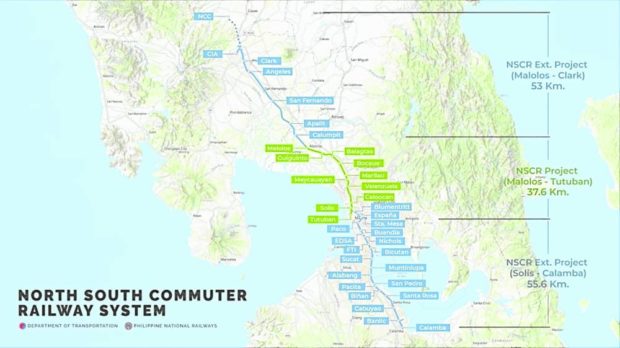Clark-Calamba rail project sets work on south section

The President on Thursday led the ceremonial contract signing in Malacañang for the southern portion of the P873.62-billion, 35-station North-South Commuter Railway (NSCR) project that will run from Clark Freeport and Special Economic Zone in Pampanga to Calamba City in Laguna.
“Imagine the comfort and convenience of traveling via train from Clark International Airport to Calamba in just two hours. This is something that I still marvel at because in my lifetime, we have never seen that,” the President said in his remarks after witnessing the signing of two contract packages for the south section of the NSCR called the South Commuter Railway Project (SCRP) with Acciona-DMCI Joint Venture and Leighton-First Balfour Joint Venture, the two groups that bagged the deals last February.
“In a larger context, this is also an extremely exciting prospect, because it means that all phases of the NSCR system are now officially in full swing. In its entirety, with a total length of 147.26 kilometers of railway, the NSCR mega-project will be a massive boost to our overall transportation infrastructure [and] will benefit up to 800,000 passengers per day,” he added.
Transportation Secretary Jaime Bautista signed the contracts with Ruben Camba of Acciona-DMCI and Jan Torka of Leighton-First Balfour. Asian Development Bank (ADB) country director for the Philippines Kelly Bird also witnessed the signing. The Manila-based ADB is cofinancing the SCRP with the Japan International Cooperation Agency (Jica).
The President also underscored the importance of consistency in policy and program implementation of major infrastructure projects began by his predecessors.
“Considering the time, effort and resources required to complete a project of this size, of this scale, and of this magnitude, it is important that we recognize the achievements and we acknowledge the work of those who have already begun [them], who came before us. Building on these strategic and progressive accomplishments, this administration shall commit consistency of policy and program implementation,” he said.
Completion in 2029
The NSCR was approved during the Aquino administration and financing was obtained during the Duterte administration. Rapid railway systems linking Metro Manila, Central Luzon, and Calabarzon (Cavite, Laguna, Batangas, Rizal, Quezon) were also planned and partly undertaken under previous presidents.
Mr. Marcos said the completion of the full NSCR line would bring great convenience to commuters.
“It will offer an efficient and comfortable transport alternative that spans a great distance, connecting Pampanga to Manila and then to Laguna,” he said.
The project would not only decongest Metro Manila’s main thoroughfares but also bring speedier transactions, quality time, and improved quality of life for all, the President noted.
The railway system, he added, would spur economic activities in the interconnected regions, and the areas in between, as well as promote environmental sustainability and public health.
He said the civil works for the contract packages would also generate more than 2,000 jobs and create other opportunities and livelihood during the construction.
The President thanked ADB and Jica for being the country’s active and consistent partners in infrastructure development for many years.
He said the support of ADB and Jica has been instrumental in the government’s efforts to provide safe, sustainable, and efficient public transportation for the people.
According to the Presidential Communications Office and the Department of Transportation, civil works for the 55.6-km southern section from Blumentritt in Manila to Calamba is targeted to start by June this year. It will have 19 stations and one depot in Barangay Banlic in Calamba.
Upon completion in 2029, the entire NSCR system would reduce the travel time between Clark airport and Calamba to two hours from four hours.
The Philippine National Railways, however, said it would be closing certain routes for up to five years starting next month to give way to construction work on SCRP, affecting some 30,000 daily train commuters.